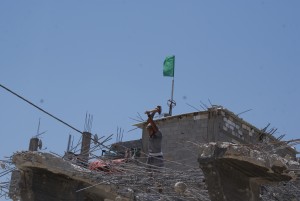Get off my cloud: Brussels residents protest flight paths
Residents of Brussels and the surrounding area are again protesting at the rerouting of flight paths in the capitals skies.
Brussels will become a no-night flight zone, if certain action groups get their way. As the elections loom, discontent over the routing of flights over the city is mounting.
Residents on Brussels' northern outskirts protest that they are being kept awake so that the rest of the capital can sleep. They complain that since last November, most day and night flights have been redirected their way. They are demanding a wider dispersal of the 250 planes per day that fly over their homes.
The rerouting was introduced so that aircraft would fly over ‘less populated' areas. But affected residents point out that more than 100,000 people live under the new flight route.
This has prompted residents in other parts of the city to get together and demand a complete ban on night flights. “We are trying our utmost to make this an election issue,” says a spokeswoman for Air Libre, an umbrella group of 20 Brussels residents committees which wants a reduction in daytime flights.
To publicise its point, Air Libre and AWACSS – which represents residents on the eastern fringe of Brussels – recently blocked an access road to the airport. “Our main purpose was to make decision-makers aware that we also exist,” Michel Fouarge, founding member of Awacss, explained.
Actie Noordrand/Daedalus, an action group representing northern residents, says that calls to ban night flights miss the point, because they don't address the issue of daytime air traffic. “The biggest problem is the concentration of flights over the northern suburbs,” says Roger Vermeiren of Actie Noordrand. During the day time, Vermeiren explains, a plane roars over the rooftops of northern residents on average every six minutes, increasing to every two minutes at peak hours.
Actie Noordrand would like to see the map above the city's skies redrawn to remove the concentrated flight corridor. It argues that distributing the nuisance would dilute overall suffering. “Two flights an hour may be a little annoying, but one flight every couple of minutes is unbearable,” says Vermeiren.
But other neighbourhoods want a total ban on night flights. “In our opinion, there is no alternative to banning night flights,” AWACSS's Fouarge insists. “(Actie Noordrand) want to decrease the flights above their heads and increase those over ours. It is not realistic, as we know that only one noisy flight during the night is enough to wake you up.”
Rather than redistributing day traffic, Air Libre want a cut in the total number of daytime flights leaving the airport. It says this can be done by making better use of seating space on aircraft, from the current level of 55 per flight to 98, a target achieved at Schipol, Amsterdam.
All this poses a problem for Transport Minister Isabelle Durant (Ecolo). If she delivers on a deal struck in January to redistribute night flights, she may alienate her constituents in Schaerbeek and the predominantly francophone residents of Brussels, who currently enjoy silent night skies.
Brussels City Council, along with other inner city communes and Air Libre, is trying to reverse the January agreement. “The decision to disperse flights over several corridors contradicts reports provided by an international panel of experts. They recommended that flight routes be concentrated over less populated areas, for security and cost reasons,” an
Air Libre spokeswoman said.
The issue is a hot potato for Durant. If she tries to keep the current routes in place, she risks being accused of currying favour with Walloon voters at the expense of the Flemish residents who live under the concentrated flight paths. If the Green minister pushes for a complete ban on night flights, she is in danger of being shot down by liberal and labour ministers fearing a loss of business and jobs at the airport.
Parcel courier DHL, responsible for most night traffic, has threatened to pull out of Belgium if those flights are banned. This could cost more than 3,000 jobs. But Air Libre and AWACSS dispute the economic case for maintaining night flights. “As citizens, we are not allowed to mow our lawn on Sunday, but airplanes may fly over our heads. We are not allowed to make noise between 22.00 and 05.00, but the airplanes are,” argues Fouarge.
Air Libre says a study carried out in Brussels demonstrates that the €11 million health costs associated with night flights outweigh the €6 million in tax revenue from the airport. It also estimates that the airport produces 25% of the capital's air pollution, costing the economy some €400 million in indirect costs.
__________
This article appeared in the 25 April 2003 issue of The Bulletin


